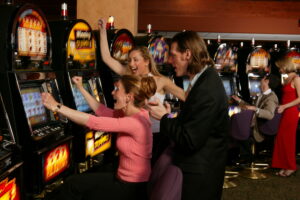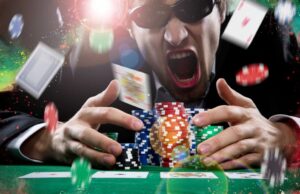The DSM-5 (Diagnostic and Statistical Manual of Mental Disorders, fifth edition) has recognized gambling as a potential behavioral addiction.
Gambling Disorder DSM-5: Individuals who display four (or more) of the following in a 12-month period have persistent and recurring problematic gambling habits, which leads to clinically substantial impairment or distress.
The physiological and psychological dependence on a pharmacological substance is commonly referred to as addiction or dependency. Dependence is described as requiring increasing amounts of a substance to have the same effect as before, a physiological and/or psychological state that develops in reaction to the cessation of use, and compulsive usage despite negative effects. Gambling, as well as buying, sex, exercise, eating, and consuming electronic media, are all being increasingly related to, or examined for, the idea of dependency.
Gambling is the only conduct now classified as a behavioral addiction, according to the DSM-5 (American Psychiatric Association, 2013). Pathological gambling is classed as an Impulse Control Disorder NOS in the DSM-IV (Diagnostic and Statistical Manual of Mental Disorders, Fourth Edition) (Not Otherwise Specified).
Gambling is described as putting money, valuable objects, or even behaviors on the line in the hopes of getting something more valuable. Many people can gamble without developing the characteristics of behavioral addiction, such as incursion into other aspects of life, impairment, or making life unmanageable. People will spend modest sums of disposable cash on leisure or pleasure on occasions, such as buying $10.00 worth of scratch tickets, spending a weekend at a casino, or spending an afternoon at horse or dog racing. They enter with the understanding that they will most likely lose, that they will not be disturbed by the loss and that they will leave when their disposable income or lost earnings have been drained. Winning comes as a pleasant surprise. They may not gamble again for several weeks or months, and they do not devote much thought to the next gaming event.
Does the DSM-5 include Internet gambling disorder?
Internet Gaming Illness is defined in Section III of the fifth edition of the Diagnostic and Statistical Manual of Mental Disorders (DSM-5) as a disease that requires further clinical investigation and experience before being considered for inclusion in the main book as a formal disorder.
Gambling Disorder, like drug addiction, is thought to have a neurological foundation. Fledman (2013) used fMRI (functional Magnetic Resonance Imaging) to discover which brain areas are linked with gambling’s reward qualities. Gamblers, as previously stated, have cognitive distortions regarding cause and effect, as well as reward and punishment, which can lead them to continue to engage in high-risk gambling even when they are losing a lot of money (Feldman, 2013).
What are the 9 criteria for Internet gaming disorder according to the DSM-5?
To be diagnosed with IGD, five of the nine DSM-5 diagnosis criteria must be satisfied within a year (preoccupation or fixation, withdrawal, tolerance, loss of control, loss of interest, continuing usage, deception, escape of unpleasant feelings, functional impairment).
- To obtain the necessary level of excitement, he must wager with increasing quantities of money.
- When seeking to reduce or eliminate gambling, he or she becomes agitated or angry.
- Has tried and failed to regulate, limit, or quit gambling on several occasions.
- Is frequently concerned with gambling (e.g., has recurring thoughts of reliving prior gambling experiences, handicapping or planning the next endeavor, or thinking of methods to get money with which to wager).
- When in a bad mood, people frequently bet (e.g., helpless, guilty, anxious, depressed).
- When one loses money gambling, it is common to return the next day to make up for it (“chasing” one’s losses).
- Lies are spoken to hide the depth of one’s gambling activity.
- Because of gambling, he or she has compromised or lost a crucial relationship, employment, or educational or career opportunity.
- Relies on others to help with money in order to get out of a financial bind created by gambling.
Is kleptomania in the DSM-5?
Kleptomania is defined as a Disruptive, Impulse-Control, and Conduct Disorder in the DSM-5.
Kleptomania is a complex disorder characterized by repeated but unsuccessful attempts to stop stealing. It is frequently found in people who also have another (coexisting) disorder, such as mood, anxiety, or eating disorders, as well as obsessive-compulsive disorder, major depression, or social phobia. It’s possible that the “thrill” of stealing aids in the relief of symptoms in clinically depressed people.
Risk Factors for Gambling Disorder ( DSM-5 )
A number of risk factors for Gambling disorders are included in the DSM-5:
- Temperamental Factors: Some gamblers start while they are young, in childhood or adolescence. This early beginning has been linked to the emergence of Gambling Disorder (American Psychiatric Association, 2013).
- Genetic and physiological factors: Gambling disorders can run in families as a result of social/environmental learning and genetic susceptibility. Gambling Disorder has been linked to catecholamines (serotonin, norepinephrine, and dopamine), as well as opioid and glutamate neurotransmitter systems (Potenza, 2013)
Comorbidity with Gambling Disorder
The following conditions are listed as co-morbid with Gambling Disorder in the DSM-5:
- Increased risk of general medical issues: Gambling disorder is linked to bad health in general, as well as two particular conditions: tachycardia and angina pectoris. Both of these disorders are more common in those who have gambling disorders. While angina pectoris is a sign of heart illness, tachycardia might be a sign of something else. Anxiety and excitement are two examples of circumstances that might cause a high resting heart rate.
- An increase in the number of people suffering from mental illnesses.
- Substance abuse problems.
- Depressive disorders are a kind of depression.
- Anxiety disorders are a type of anxiety condition.
- Antisocial Personality Disorder (APD) is a kind of personality disorder (American Psychiatric Association, 2013).


